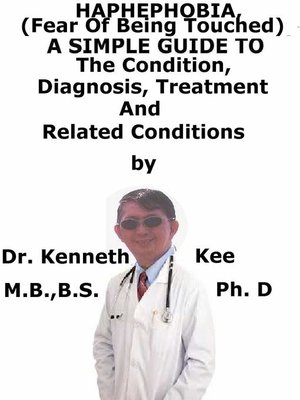Haphephobia, (Fear of Being Touched) a Simple Guide to the Condition, Diagnosis, Treatment and Related Conditions
ebook
By Kenneth Kee

Sign up to save your library
With an OverDrive account, you can save your favorite libraries for at-a-glance information about availability. Find out more about OverDrive accounts.
Find this title in Libby, the library reading app by OverDrive.



Search for a digital library with this title
Title found at these libraries:
| Loading... |
This book describes Haphephobia, Diagnosis and Treatment and Related Diseases
I have witnessed many people in the Christian Church that I go to who have this fear of being touched or holding hands.
This also happened to some patients in my Clinic.
Haphephobia is an anxiety disorder featured by a fear of being touched.
Other names for haphephobia are:
1. Chiraptophobia,
2. Aphenphosmphobia, and
3. Thixophobia.
People with haphephobia are fearful of being touched.
With haphephobia, human touch can be overwhelming and even in some cases painful.
In some patients, the fear is specific to only one gender, while in other patients the fear is applied to all people.
When touched by strangers or without consent, many people feel uncomfortable.
If the fear is severe, it occurs even when touched by family or friends, and if it produces significant distress, it may be haphephobia.
This disorder is not the same as a hypersensitivity to touch, which is called allodynia.
A person with allodynia may also do not want to be touched, but they do so because it produces them to feel pain rather than fear.
Causes
Phobias can also occur in the family.
A person can discover a fear of being touched if they see a loved one showing fear or avoidance of being touched.
While haphephobia can occasionally happen on its own, it can also be linked to other disorders.
These are:
1. A fear of germs (mysophobia):
A person may avoid being touched due to a fear of contamination or poor hygiene
2. A fear of crowds (ochlophobia):
A person with ochlophobia can feel worried about being touched by strangers in crowds.
3. Obsessive-compulsive disorder (OCD):
A person with OCD may be worried about certain situations outside of their control, such as being touched by other people.
4. Post-traumatic stress disorder (PTSD):
A fear of being touched can come from a prior traumatic experience that involved being touched, such as witnessing or going through an assault or sexual abuse.
Symptoms
Fear of being touched is indicated to be a phobia when the fear occurs almost every time the person is touched, continues for over 6 months, and when it affects relationships or work life.
These symptoms may indicate haphephobia:
1.Immediate fear or anxiety when touched, or when thinking about being touched
2.Panic attacks, which can involve an increased heart rate, sweating, hot flushes, tingling, and chills
3.Avoiding situations where a person may be touched
4.Consciousness that the fear is not rational and disproportionate
5.General anxiety, depression, and poor quality of life as a result of the phobia
Children may show these symptoms when touched:
1.Crying
2.Freezing in position
3.Temper tantrums
4.Clinging to their caregiver
Diagnosis
Haphephobia is diagnosed with the same criteria that the new edition of the Diagnostic and Statistical Manual of Mental Disorders publishes for diagnosing any specific phobia
Treatment
One of the biggest problems in overcoming a phobia is to avoid the situation that produces the fear.
The treatments focus to help a person deal with the anxiety linked to their fear and to overcome their fear slowly
Effective treatments for phobias are:
Psychotherapies
1.Behavioral therapies
Cognitive behavioral therapy, such as dialectical behavioral therapy or hypnosis, can help people gain control over fears and phobias.
2.Exposure therapy
In this form of treatment, the patient is slowly exposed to the feared touch over weeks or months
3.Medicines






